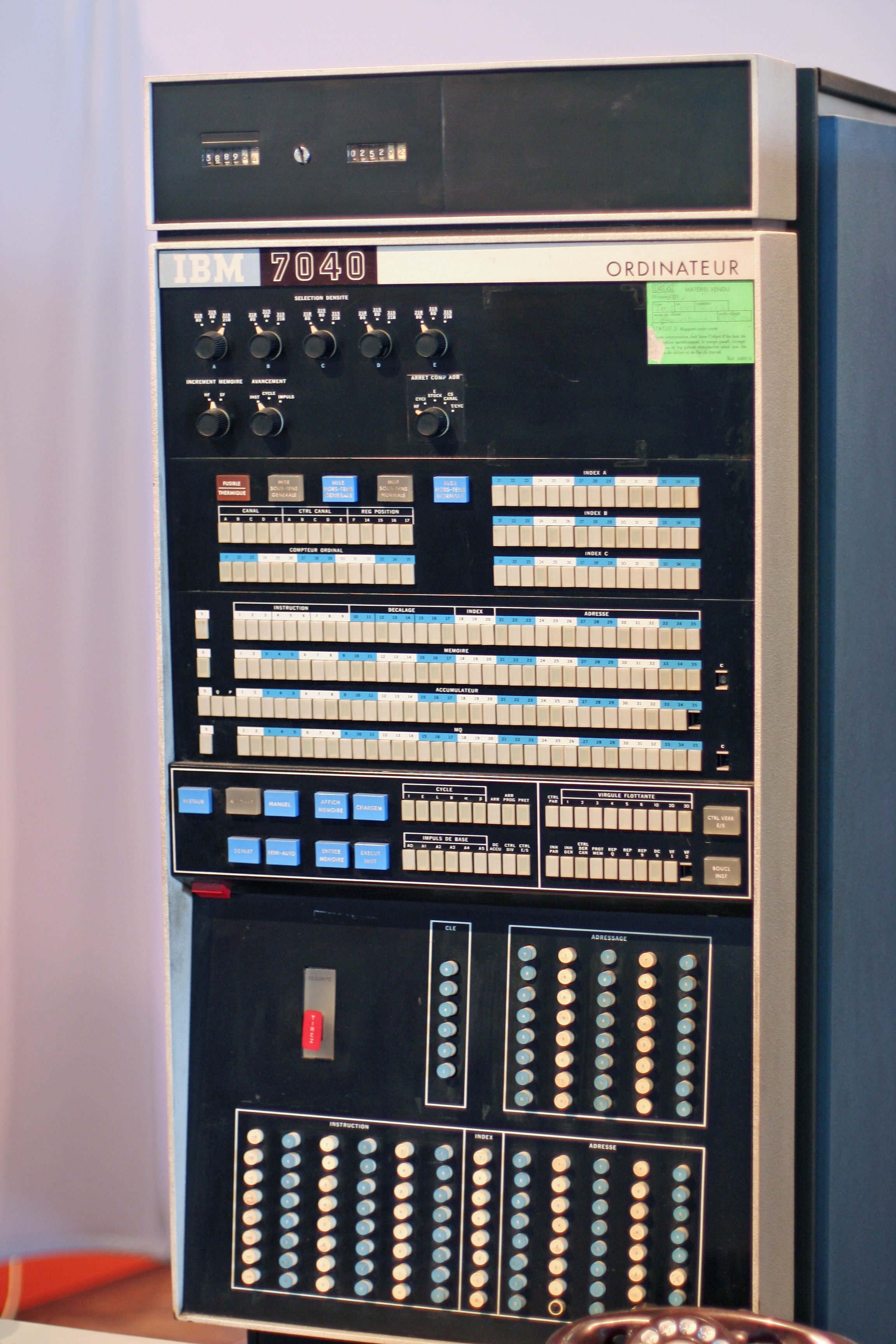IBM 7040 on:
[Wikipedia]
[Google]
[Amazon]
 The IBM 7040 was a historic but short-lived model of
The IBM 7040 was a historic but short-lived model of 
 The IBM 7040 was a historic but short-lived model of
The IBM 7040 was a historic but short-lived model of transistor computer
A transistor computer, now often called a second-generation computer, is a computer which uses discrete transistors instead of vacuum tubes. The first generation of electronic computers used vacuum tubes, which generated large amounts of heat, w ...
built in the 1960s.

History
It was announced byIBM
International Business Machines Corporation (using the trademark IBM), nicknamed Big Blue, is an American Multinational corporation, multinational technology company headquartered in Armonk, New York, and present in over 175 countries. It is ...
in December 1961, but did not ship until April 1963. A later member of the IBM 700/7000 series
The IBM 700/7000 series is a series of large-scale (Mainframe computer, mainframe) computer systems that were made by IBM through the 1950s and early 1960s. The series includes several different, incompatible processor architectures. The 700s ...
of scientific computers, it was a scaled-down version of the IBM 7090
The IBM 7090 is a second-generation Transistor computer, transistorized version of the earlier IBM 709 vacuum tube mainframe computer that was designed for "large-scale scientific and technological applications". The 7090 is the fourth member o ...
. It was not fully compatible with the 7090. Some 7090 features, including index registers, character instructions and floating point, were extra-cost options. It also featured a different input/output architecture, based on the IBM 1414 data synchronizer, allowing more modern IBM peripherals to be used. A model designed to be compatible with the 7040 with more performance was announced as the 7044 at the same time.
Peter Fagg headed the development of the 7040 under executive Bob O. Evans.
A number of IBM 7040 and 7044 computers were shipped, but it was eventually made obsolete by the IBM System/360
The IBM System/360 (S/360) is a family of mainframe computer systems announced by IBM on April 7, 1964, and delivered between 1965 and 1978. System/360 was the first family of computers designed to cover both commercial and scientific applicati ...
family, announced in 1964. The schedule delays caused by IBM's multiple incompatible architectures provided motivation for the unified System/360 family.
The 7040 proved popular for use at universities, due to its comparatively low price. For example, one was installed in May 1965 at Columbia University
Columbia University in the City of New York, commonly referred to as Columbia University, is a Private university, private Ivy League research university in New York City. Established in 1754 as King's College on the grounds of Trinity Churc ...
.
One of the first in Canada was at the University of Waterloo
The University of Waterloo (UWaterloo, UW, or Waterloo) is a Public university, public research university located in Waterloo, Ontario, Canada. The main campus is on of land adjacent to uptown Waterloo and Waterloo Park. The university also op ...
, bought by professor J. Wesley Graham
James Wesley Graham, OC was a Canadian professor of computer science at the University of Waterloo.
Graham was born on January 17, 1932, in Copper Cliff, Ontario. His interest in computing developed while studying math and physics at the ...
. A team of students was frustrated with the slow performance of the Fortran compiler. In the summer of 1965 they wrote the WATFOR
WATFIV (Waterloo FORTRAN IV), developed at the University of Waterloo, Canada is an implementation of the Fortran computer programming language. It is the successor of WATFOR.
WATFIV was used from the late 1960s into the mid-1980s. WATFIV was i ...
compiler for their 7040, which became popular with many newly formed computer science departments.
IBM also offered the 7040 (or 7044) as an input-output processor attached to a 7090, in a configuration known as the 7090/7040 Direct Coupled System (DCS). Each computer was slightly modified to be able to interrupt the other.
IBM used similar numbers for a model of its eServer pSeries 690 RS/6000
The RISC System/6000 is a family of RISC-based (Reduced Instruction Set Computer-based) Unix servers, workstations and supercomputers made by IBM in the 1990s. The RS/6000 family replaced the IBM RT PC computer platform in February 1990 an ...
architecture much later. The 7040-681, for example, was withdrawn in 2005.
See also
*List of IBM products
The list of IBM products is a partial list of products, services, and subsidiaries of IBM, International Business Machines (IBM) Corporation and its predecessor corporations, beginning in the 1890s.
Context
Products, services, and subsidiari ...
* IBM mainframe
IBM mainframes are large computer systems produced by IBM since 1952. During the 1960s and 1970s, IBM dominated the computer market with the 7000 series and the later System/360, followed by the System/370. Current mainframe computers in IBM' ...
* History of IBM
References
External links
* {{Authority control 7040 7 7040 36-bit computers ja:IBM 7040